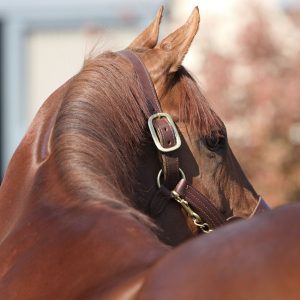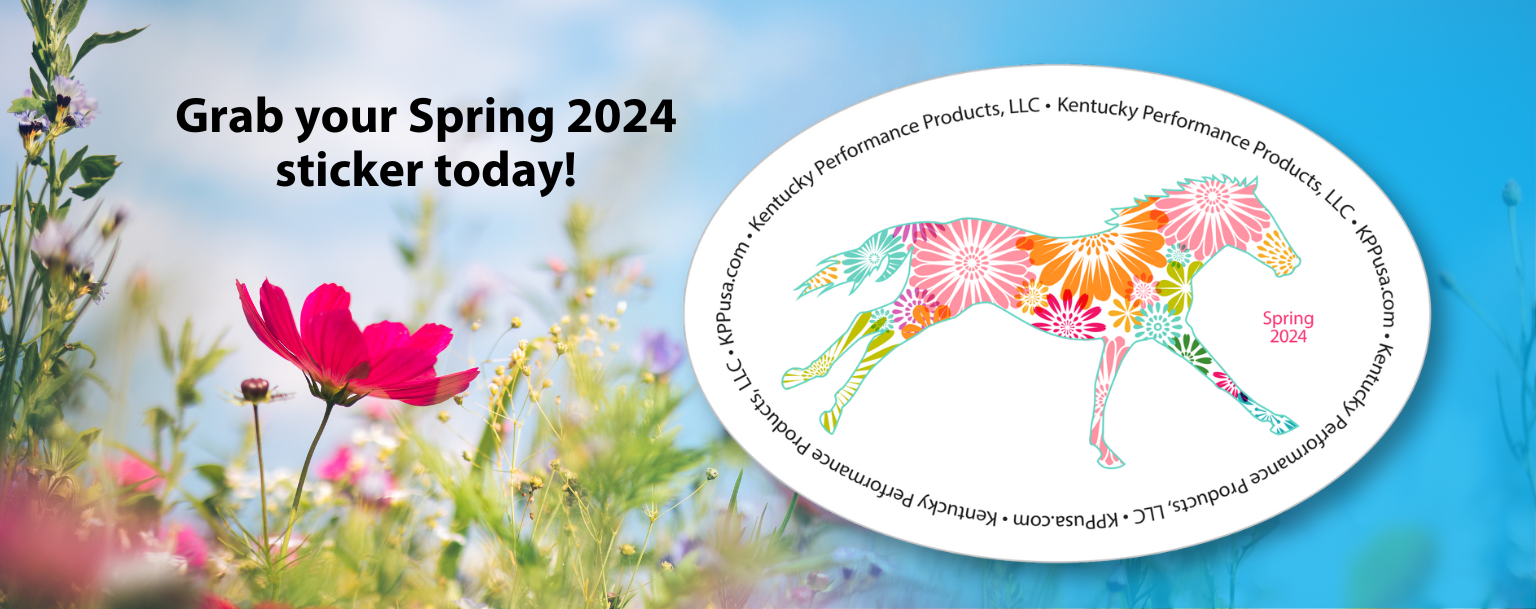
Put the Bloom Back in Your Horse’s Coat
Does your horse struggle with dull, flaky hair coat? Are his mane and tail dry and brittle? The quality of your horse’s hair is based in part on his genetic makeup, but nutrition can also play a role.
Nutrients affect hair quality
Protein
Skin and hair need protein. Proteins are made up of different amino acids and each amino acid has a purpose. Protein deficiency is rarely seen, but your horse may be lacking certain amino acids that affect hair quality. Methionine and lysine are both found in high levels in healthy hair.
Horses eating a diet consisting of mostly mature grass hay or those eating only small amounts of grain or concentrates can be lacking in the essential amino acids methionine and lysine.
(Learn more about amino acids in: Protein Demystified.)
Fat
Ever notice how your horse dapples out when the spring grass comes on? This is partly due to the fat found in fresh grass. Yes, fat; specifically omega-3 and omega-6 fatty acids that are found in grass. These fats give your horse’s coat a wonderful bloom and keep his skin soft and supple.
Horses that are not able to graze on fresh grass can be found lacking in these essential fatty acids. It is very important to provide adequate supplies of omega-3 fatty acids, which are often deficient in modern equine diets.
(Learn more about omega-3 fatty acids in: Omega fatty acid balance is essential to good health.)
Minerals
Copper, zinc and selenium all affect hair quality. In the case of selenium, too much may cause hair loss of varying degrees. When it comes to zinc, deficiencies will slow hair re-growth. Other symptoms may include lack of shedding and dry, flaky skin. Zinc deficiencies make skin more susceptible to irritation and infection. Copper is a key component in pigmentation. Horses suffering from insufficient copper may have bleached-out hair. Sun damage is more likely and coats tend to be dry and brittle.
Horses at risk for mineral deficiencies or imbalances include those on restricted diets, horses maintained on mature hay, and horses that eat plain grains or small amounts of concentrates. Horses in rigorous training may have exceptional needs. Review your horse’s diet with a trained nutritionist or your veterinarian to determine if his or her mineral needs are being met.
Vitamins
The vitamins that are most likely to have an impact on hair quality are biotin, vitamin B6 (pyridoxine), and vitamin A. Deficiencies in vitamin A are very rare, and most horses synthesize adequate B vitamins on their own. However, biotin is different. Horses may not make enough biotin to meet their needs. Biotin deficiencies can cause hair to become fine and brittle. Dryness and flaking are also symptoms. Supplemental biotin is readily available.
If your horse’s dull, dry hair coat, skin problems, and brittle mane and tail are causing you grief, check your horse’s diet. Access to high-quality forages (grass and hay), along with the addition of a balanced concentrate fed at the correct level, and/or a coat supplement may be just the thing to put the bloom back in your horse’s coat.



3 Comments
MY 15 YR OLD DANISH WARMBLOOD HAIR STARTED COMING OUT IN PATCHES SOME WITH SOME OPEN SIRES. NOW SEEMS TO BE SHEDDING OUT VERY DULL COAT IN THE MONTHS OF JUNE AND JULY— THE VET SAID HAD DERMITITUS AND GAVE ME 35.00 SHAMPOO FOR 2 TIMES A WEEK— SEEMS TO BE A PROBLEM THAT IS MORE THAT JUST HAT— I AM FEEDING TWICE A DAY– AND A CUP AND A HALF OF OMEGA COMPLETE.. ABOUT 1200 LBS.. HE WAS A RESCUE 4 WEEKS AGO. NEEDED WEIGHT WHICH O AM WORKING ON— BUT SO DISCOURAGED WITH HIS COAT…. ANY SUGGESTIONS. THAT I CAN DO— I WILL FOLLOW YOUR ADVICE AND ACT ACCORDINGLY. THANK YOU SOOOOOO MUCH. SONDRA GARNER IN MADISON,.GA
Hello Sondra,
Skin and hair coat problems can be very frustrating. Poor coat quality is often one of the first symptoms of illness or poor nutrition. Our first recommendation is always to consult a veterinarian and rule out possible illness, parasite overload or poor teeth, which you have already done. You are already ahead of the game.
When considering a good feeding strategy, be sure a high-quality fiber (hay or pasture) is the foundation of your diet. Your 1,200 lb warmblood should be eating at least 1.5% to 2% of his body weight, 18 to 24 pounds of fiber per day. A mix of time out grazing and a good quality grass hay or a grass/legume mixed hay is best. If you are feeding a concentrate (pellet or sweet feed) follow the manufacturer’s recommendation and feed at least the minimum suggested amount to ensure your horse is getting all the vitamins and minerals he needs. If you can’t feed at least the minimum recommended amount, or if you are not feeding any concentrate at all, then consider adding a well-balanced vitamin and mineral pellet such as Micro-Phase to the diet. Once your base diet is balanced to meet his minimum requirements, you can start choosing the right supplement to address any additional challenges your horse is facing.
To support optimal coat and skin health I would recommend adding 1 scoop (1 oz) of Ker-A-Form hoof and coat supplement per day to your boy’s diet. Ker-A-Form contains essential amino acids, high-quality fats, lecithin, and the critical nutrients that serve as the building blocks for healthy hair and hoof: biotin, methionine, iodine and zinc. You should see a difference in coat quality within the first two weeks. Changes in the hoof will become noticeable as the new hoof grows out. A 3-lb bucket of Ker-A-Form is a 48-day supply for one horse.
Skin problems can be very challenging. To support reduction in overall inflammation and mitigate any allergic response in horses battling skin problems, I recommend providing additional omega-3 fatty acids in the diet. Omega-3 fatty acids are known to be anti-inflammatory in nature. Kentucky Performance Products’ Contribute omega-3 fatty acid supplement guarantees a level of 10,780 mg of omega-3 per ounce. A complete complement of omega-3 is supplied: 3,210 mg of EPA and 2,320 mg of DHA, both from high-quality fish oil and alpha-linolenic acid in the form of flax oil. Contribute guarantees an 8:1 ratio of omega-3 to omega-6 fatty acids. One gallon of Contribute is a 128-day supply at 1 ounce per day, or a 64-day supply at the maximum dose of 2 ounces per day. Two ounces of Contribute will provide 1,000 kcal of energy to the diet. When introducing Contribute to the diet, do so slowly over 7 days. Start with a small amount (1/4 tbsp.) mixed in the feed and increase the amount daily until you reach the full dose.
In your situation I would recommend working up to 2 ounces per day (1 ounce per feeding). Once his skin problem resolves, you can drop down to 1 ounce per day. Since Contribute is primarily fish oil it might be a flavor you horse is unaccustomed to. If necessary, mix Contribute with some applesauce or yogurt until he gets used to the flavor. Once a horse becomes accustomed to the new taste they will eat Contribute with no problem. My warmblood licks his feed tub clean every night!
To help your guy strengthen his immune system (which will help in the battle with skin dermatitis) and support muscle development, I would recommend 3 scoops (3,000 IU) of Elevate Maintenance Powder per day. Elevate contains a highly bioavailable source of natural vitamin E. Natural vitamin E is a critical nutrient often missing from the equine diet, as its primary source is fresh green grass. Horses grazing 18 plus hours a day on good pasture can meet their maintenance requirements, but given your horse’s challenges his requirement is more than likely much higher and he many even be battling a deficiency given his past history. You can split the amount into 1 ½ scoops per feeding or feed it all at once. A 2-pound jar of Elevate Maintenance Powder will last you 43 days when feeding 3 scoops per day.
The Kentucky Performance Products strategy
Kentucky Performance Products supplements are formulated to address specific nutritional challenges. They are meant to be fed along with the well-balanced diet outlined in the first paragraph. By choosing and combining the right complement of supplements, you can target specific problems and supply the appropriate nutritional support without adding unnecessary nutrients that might cause imbalances or over-supplementation. Our supplements are made with high-quality ingredients that are included at research-proven levels so you get results.
Comparing the nutritional contribution of Omega Complete to the combination of Contribute, Ker-A-Form and Elevate, when comparing Contribute to the Omega Complete you will notice that both of the oils in Contribute are high in omega-3, while the primary oil in Omega Complete is soy oil, which is much higher in omega-6 fatty acids than omega-3 fatty acids. Omega Complete makes no guarantee on the amount of omega-3 fatty acids provided or the ratio of 3 to 6, while Contribute does. Contribute is a superior source of omega-3 fatty acids.
As far as supporting coat and hoof quality, Omega Complete is missing several of the critical nutrients needed to build strong keratin bonds, the main building blocks of coat and hoof. Omega Complete provides fats that increase the shine of the coat and help rehydrate dry skin, but Ker-A-Form provides those same fats plus the nutrients that serve as the building blocks to support the growth of healthy skin, hair and hoof. When dealing with skin, coat and hoof problems, Ker-A-Form supplies a more complete level of support than does Omega Complete.
While Omega Complete does state that they provide 1,200 IU of natural vitamin E per 4 ounces, they do not list the type of natural E they use. Source matters a great deal in how a horse absorbs and utilizes vitamin E. Elevate guarantees 1,000 IU of pure d-alpha-tocopheryl per scoop (7 g), which is the type of vitamin E most readily absorbed and retained in the tissues of a horse. Elevate Maintenance Powder is the number one veterinary-recommend source of natural vitamin E powder.
I have given you a ton of information and links to much more. Please let me know if you have any further questions. I hope your boy starts feeling and looking better soon.
Karen at KPP
Pingback
[…] a balanced diet is one of the most essential steps in keeping the quality of the coat at its peak. Kentucky Performance Products recommends including the right amount of proteins, fats, vitamins and minerals in your […]